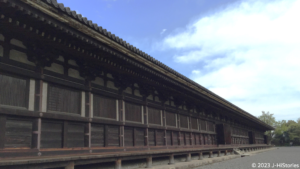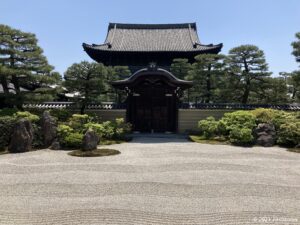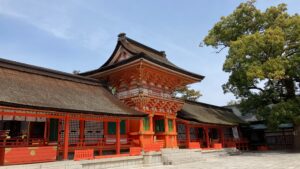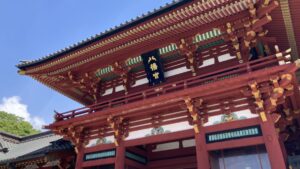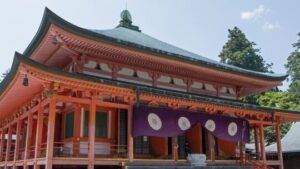Hiraizumi: A Prosperous City of the Oshu Fujiwara Clan that Lasted 100 Years
The cedar-lined Tsukimizaka (Moon Viewing) slope of Chuson-ji Temple in a solemn mountain atmosphere brings you to the Konjikido Golden Hall, which retains its appearance of those days. Stepping into it, you may feel Fujiwara Kiyohira’s aspiration to build a Buddhist Land (an ideal peaceful nation on the Buddha’s teaching) from the entire structure. It […]
Sanjusangen-do Hall in Kyoto: Emperor Go-Shirakawa and the Buddhist Meaning of “33”
Sanjūsangen-dō Hall in Kyoto was built in 1164 by Emperor Go-Shirakawa and houses 1,001 statues of the Thousand-Armed Kannon. Learn the Buddhist meaning of “33.”
Kenninji Temple, the oldest Zen Temple and beautiful Zen Garden in Kyoto
The hustle-bustle of Hanamikoji Street in the center of Kyoto is belied by the tranquility of Kenninji as the head temple of the Kenninji school of the Rinzai sect of Zen Buddhism. The Imperial Gate in front, Sanmon Gate, Dharma Hall, and Hojo Hall stand in the Zen-style straight line. After studying Zen Buddhism in […]
The History of Hachiman Deity Worshipped at Usa Jingu Shrine, Protecting Japan and Samurai
Usa Jingu is the head shrine of approximately 460,000 Hachimangu shrines, out of a total of 110,000 shrines in Japan. This makes it the largest number in Japan. The three major Hachimangu shrines are Usa Jingu in Kyushu, Hakozakigu in Kyushu, and Iwashimizu Hachimangu in Kyoto. The deity worshipped at Usa Jingu Shrine, Hachiman Omikami, […]
Tsurugaoka Hachimangu Shrine in Kamakura, The Birthplace of The Samurai Government
Tsurugaoka Hachimangu Shrine, the birthplace of the Samurai government esta blished by Minamoto Yoritomo in 1185 in Kamakura.
Enryakuji Temple Enlightens the World for over 1200 years
Enryakuji on Mt. Hiei was founded by Saicho. Producing founders of several sects, it's called the "Mother of Japanese Buddhism." Enryakuji fought against three warlords: Oda Nobnaga, Shogun, and its retainer.


